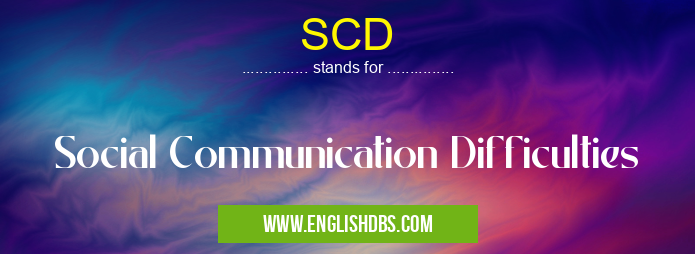What does SCD mean in CLINICAL MEDICINE
Social Communication Difficulties (SCD) is a term used to describe a range of difficulties that individuals may experience in social communication and interaction. SCD can affect a person's ability to understand and respond to social cues, engage in meaningful conversations, and build and maintain relationships.

SCD meaning in Clinical Medicine in Medical
SCD mostly used in an acronym Clinical Medicine in Category Medical that means Social Communication Difficulties
Shorthand: SCD,
Full Form: Social Communication Difficulties
For more information of "Social Communication Difficulties", see the section below.
What is SCD?
SCD refers to difficulties in understanding and using social cues, such as body language, facial expressions, and tone of voice. Individuals with SCD may also have difficulty with:
- Social interaction: Participating in conversations, making friends, and understanding social norms
- Pragmatics: Using language appropriately in different social contexts
- Nonverbal communication: Interpreting and expressing emotions through gestures, facial expressions, and body language
- Theory of mind: Understanding the thoughts and feelings of others
Causes of SCD
The exact causes of SCD are not fully understood, but it is believed to involve a combination of genetic and environmental factors. Risk factors for SCD include:
- Autism spectrum disorder (ASD)
- Specific language impairment (SLI)
- Intellectual disability
- Attention deficit hyperactivity disorder (ADHD)
- Traumatic brain injury
- Language deprivation
Essential Questions and Answers on Social Communication Difficulties in "MEDICAL»CLINICAL"
What are Social Communication Difficulties (SCD)?
SCD refers to a range of difficulties that individuals may experience in understanding and responding appropriately to social cues and interactions. These difficulties can impact areas such as social understanding, social interaction, and social imagination.
What are the symptoms of SCD?
Symptoms of SCD can vary depending on the individual's developmental stage and may include difficulties with:
- Understanding nonverbal cues, such as facial expressions or body language
- Initiating and maintaining conversations
- Interpreting social situations and responding appropriately
- Expressing emotions and thoughts
- Engaging in imaginative play or pretend scenarios
What causes SCD?
The exact causes of SCD are not fully understood, but it is believed to involve a combination of genetic and environmental factors. Some potential contributors include:
- Differences in brain development, particularly in areas responsible for social cognition
- Prenatal or perinatal complications
- Environmental factors, such as exposure to trauma or neglect
How is SCD diagnosed?
SCD is typically diagnosed by a multidisciplinary team, including a developmental pediatrician, psychologist, and speech-language pathologist. The diagnostic process may involve:
- Observation of the individual's social behavior
- Parent and teacher interviews
- Standardized assessments to evaluate social skills and understanding
How is SCD treated?
Treatment for SCD typically focuses on supporting the individual's strengths and addressing their specific challenges. Intervention strategies may include:
- Social skills training
- Cognitive behavioral therapy
- Speech-language therapy
- Parent training
- Educational support
Final Words: SCD can have a significant impact on an individual's social and academic development. Early diagnosis and intervention are crucial to help individuals with SCD develop the skills they need to communicate and interact effectively in society.
SCD also stands for: |
|
| All stands for SCD |
